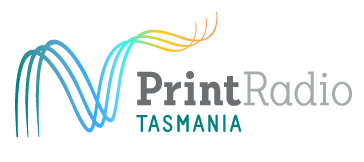
Who we are
Promoting Respect
Print Radio Tasmania embraces the social model approach to disability i.e. which seeks to achieve full participation, equity, and fair treatment by changes to society, rather than through an individual, medical approach.
We pay respect to the Muwinina (mou wee nee nar) people, the traditional and original owners of this land on which our station and services are established. We to pay respect to those past, present and emerging, and acknowledge today’s Tasmanian Aboriginal people who are the custodians of this land.
Print Radio Tasmania Inc.
We are a community radio station, located at 136 Davey St. (behind Highbury Building).
You can find us using what3words app ///giggle.cupcake.backers.
The station provides a reading and information service for people who find it difficult to access and read printed material.
Hobart was the first RPH station in Australia. We began broadcasting in June 1982 and are now part of the Australia-wide RPH network.
Print Radio Tasmania provides access to a wide variety of printed publications and material covering a wide range of topics.
Currently we broadcast over 90 different programs every week.
Your Broadcast Manager is Nigel Green and Adnan Habib is the Volunteer Coordinator and Administration Officer. Contact us at (03) 6224 1864.
Management and Governance
Here are the management committee members of Print Radio Tasmania
Position Name
President Hrisanthi Dokos
Vice President Honor Marino
Secretary/Public Officer Elizabeth Macdonald
Treasurer Ben Wilson
Member Alison Dunn
Member Bethany Garie
Member Margaret Fleming
Member Tracey Evans
A bit of history...
The Radio for the Print Handicapped movement was established in Australia in the mid 1970s, and was many years in the planning stages before it went to air. Developed by people with a print disability, it was seen by its founders as vital in providing people with a print disability with the same access to information as any other group in the community.
In July 1978, the then Minister in charge of communications, Tony Staley, granted licences around Australia for the provision of RPH services.
With assistance from State and Federal governments, the Station 7RPH was established. The State government also provided a transmitter site on Mount Nelson, Hobart. On Saturday 26 June 1982 7RPH commenced daily programming from 73 Montague Street, New Town, Hobart, and was the first RPH Radio Station anywhere in Australia to do so. In Southern Tasmania 7RPH was heard transmitted on 1620AM. In 1991, with government assistance and a new licence, 7RPH moved their transmission frequency to 864AM and their operating base to 136 Davey Street, Hobart. It has now been fitted out with four studios and provides an area for volunteers including a small kitchen area as well as an administrative office. A new transmitter was built at Rushy Lagoon, Sandford and 7RPH was able to provide an improved service to a wider audience. The service areas covered are the municipalities of Brighton, Bruny, Clarence, Glenorchy, Green Ponds, Hobart, Huon, Kingborough, Port Cygnet, Richmond, Glamorgan/Spring Bay and Tasman. In December 2003, the station commenced transmissions in Launceston, the Tamar Valley and surrounding townships on a frequency of 106.90FM. In 2012, a service was set up at Devonport on 96.1FM to extend reception further to the North West region. We have also been broadcasting on DAB+ in the Hobart region since 2019, giving the high quality transmission to those in the catchment area of the transmitter.
The association established to operate 7RPH was called Broadcast Services for the Handicapped Incorporated, which was changed at the 2004 Annual General Meeting to RPH Print Radio Tasmania Incorporated, reflecting not only the station’s wider broadcast area in the State, but also societal changes towards people with a print disability.
A further change of name to Print Radio Tasmania (PRT) was adopted at the AGM in October 2020.
We are ‘on air’ continuously, commencing local programming at 8am and concluding at midnight each day. Then, via satellite, we broadcast the BBC World Service overnight.


